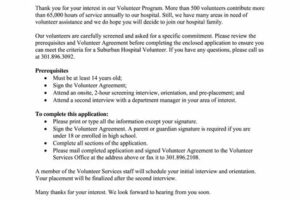Table of Contents
A hospital chaplain volunteer is a compassionate individual who provides spiritual support to patients, families, and staff in medical settings. These dedicated volunteers offer comfort, prayers, and companionship, helping individuals navigate their faith during challenging times. By offering their time and listening ear, hospital chaplain volunteers contribute to the overall well-being and healing of those they serve.
Hospital Chaplain Volunteer programs play a vital role in providing spiritual support and guidance to patients and their families during times of illness, trauma, and loss. With their compassionate presence and empathetic listening skills, these volunteers become beacons of hope in the often chaotic and overwhelming environment of a hospital. From offering prayers and religious ceremonies to simply lending a comforting ear, chaplains have the unique ability to offer solace and reassurance in the face of life’s most challenging moments. In this article, we will delve deeper into the invaluable work of Hospital Chaplain Volunteers, exploring the profound impact they have on the lives of those they serve.
The Role of a Hospital Chaplain Volunteer
When it comes to providing emotional and spiritual support to patients and their families, hospital chaplains play a vital role. These compassionate individuals offer comfort, prayer, guidance, and a listening ear during times of great need. While hospital chaplains are often full-time staff members, many hospitals also rely on the invaluable assistance of dedicated volunteers. In this article, we will explore the important work of hospital chaplain volunteers and the impact they have on the lives of those they serve.
What Does a Hospital Chaplain Volunteer Do?
As a hospital chaplain volunteer, individuals offer their time and expertise to provide spiritual care to patients, families, and even hospital staff. They may visit patients in their rooms, offering a comforting presence and a listening ear. Their role is to provide emotional support, offer prayers if requested, and help patients navigate the questions and uncertainties that often arise during moments of illness.
Importance of Spiritual Support
Spiritual support is an essential aspect of holistic healthcare, recognizing that well-being extends beyond the physical body. Hospital chaplain volunteers understand that patients and their families may have different religious or spiritual beliefs, and they respect and honor these diverse perspectives. By providing spiritual support, they help individuals find solace, meaning, and hope in the midst of challenging circumstances.
Training and Qualifications
Hospital chaplain volunteers often undergo specialized training to ensure they are equipped to handle the emotional and spiritual needs of those they encounter. This training may include coursework in pastoral care, bereavement support, crisis intervention, and cultural sensitivity. Volunteers also receive guidance from experienced chaplains and participate in ongoing education to enhance their skills.
Providing a Compassionate Presence
One of the primary roles of a hospital chaplain volunteer is to be a compassionate presence for patients and their loved ones. They offer empathy, active listening, and emotional support, creating a safe space for individuals to express their fears, doubts, and hopes. Sometimes, just having someone who cares and understands can bring immense comfort to those going through difficult times.
Supporting Families and Caregivers
Hospital chaplain volunteers not only provide support to patients but also recognize the importance of caring for their families and caregivers. They offer a listening ear, guidance, and resources to help navigate the challenges that come with supporting a loved one during a hospital stay. Whether it’s providing information about local support groups or simply offering a shoulder to lean on, these volunteers make a significant difference in the lives of those they assist.
Promoting Interfaith Understanding
Hospitals serve individuals from diverse cultural and religious backgrounds. Hospital chaplain volunteers respect and honor these differences, promoting interfaith understanding and tolerance. They are trained to provide spiritual care that is inclusive and supportive of all beliefs, ensuring that each person receives the support they need, regardless of religious affiliation.
Working as Part of a Multidisciplinary Team
Hospital chaplain volunteers collaborate with other healthcare professionals to provide comprehensive care to patients. They work alongside doctors, nurses, social workers, and other members of the healthcare team, ensuring that patients’ emotional and spiritual needs are met. By integrating the services of a chaplain into the healthcare system, hospitals can offer a holistic approach to healing.
Being a Patient Advocate
Chaplains often act as advocates for patients, ensuring their voices are heard and their concerns are addressed. Hospital chaplain volunteers excel at advocating for patients’ emotional and spiritual well-being, working closely with the healthcare team to ensure that patients receive the support they need throughout their hospitalization.
Benefits for Volunteers
While hospital chaplain volunteers dedicate their time to serving others, they also experience personal benefits from their volunteer work. Engaging in meaningful service provides a sense of fulfillment and purpose. Volunteers often report enhanced empathy, improved communication skills, and a deeper understanding of the human experience. Moreover, volunteering in a hospital setting offers unique insights into the field of healthcare and the impact it has on individuals and communities.
The Impact of Hospital Chaplain Volunteers
The presence of hospital chaplain volunteers has a profound impact on patients, families, and healthcare professionals alike. Their compassionate care provides comfort and support during challenging times, fostering a sense of hope and resilience. By addressing the spiritual and emotional dimensions of illness, hospital chaplain volunteers contribute to the overall well-being and healing of those they serve.
As the demand for spiritual care in healthcare settings continues to grow, the role of hospital chaplain volunteers becomes increasingly significant. Their dedication, empathy, and commitment to serving others make a lasting difference in the lives of those they encounter, offering a ray of light in the midst of darkness.
Hospital Chaplain Volunteer: Providing Spiritual Support in Medical Settings
In medical institutions across the country, dedicated volunteers known as Hospital Chaplains are playing a crucial role in offering spiritual support to patients, families, and healthcare staff. These compassionate individuals provide a comforting presence, lend a sympathetic ear, and offer spiritual guidance to those navigating the challenging and often emotionally charged environment of a hospital. Let’s delve deeper into the incredible work done by these Hospital Chaplain Volunteers.
1. Essential Duties and Responsibilities
Hospital Chaplain Volunteers take on various responsibilities, including supporting patients in their spiritual journeys, assisting families through difficult times, and offering spiritual solace to healthcare professionals dealing with the stresses of their demanding jobs. They often provide prayer, spiritual counseling, and accompany patients during surgeries or other critical procedures, ensuring their emotional well-being is attended to. Their presence is profoundly valuable in fostering a sense of peace and hope for all those affected by illness.
2. Qualifications and Training
To become a Hospital Chaplain Volunteer, individuals usually undergo specialized training in pastoral care, which equips them with the skills needed to provide spiritual support in a hospital setting. Most programs require participants to possess a strong foundation in their faith and a genuine empathy for others. A deep understanding of different religious practices and cultural sensitivity are also vital attributes for those seeking to fulfill this role effectively.
3. Confidentiality and Boundaries
Hospital Chaplain Volunteers adhere to strict guidelines to ensure patient confidentiality and maintain professional boundaries. They respect the privacy and beliefs of those seeking their support, ensuring that all conversations and interactions remain confidential. This commitment to confidentiality ensures a safe and non-judgmental space for individuals to express their spiritual concerns or seek guidance during challenging times.
4. Serving Diverse Religious and Non-Religious Populations
One of the most remarkable aspects of the work done by Hospital Chaplain Volunteers is their ability to cater to the diverse religious and non-religious needs of patients. Regardless of an individual’s faith or beliefs, chaplains provide inclusive care to all, offering support, compassion, and respect to each person they encounter. They are trained to embrace diversity and adapt their approach accordingly, ensuring that every patient feels supported and understood.
5. Emotional Support and End-of-Life Care
Hospital Chaplain Volunteers play a vital role in end-of-life care, providing emotional support to patients and their families during one of life’s most challenging phases. Their presence offers solace, comfort, and guidance to those experiencing grief, fear, and loss. Their ability to listen attentively and offer words of reassurance or prayer can bring immeasurable comfort during these deeply emotional moments.
6. Collaborating with Healthcare Teams
Hospital Chaplain Volunteers work alongside healthcare professionals to provide holistic care to patients. By understanding the unique spiritual needs of individuals, chaplains collaborate with doctors, nurses, and other medical staff to ensure the overall well-being of patients is addressed. This collaboration enhances the quality of care by acknowledging the interconnectedness of physical, emotional, and spiritual healing.
7. Support for Staff and Volunteers
Recognizing the immense emotional toll of working in a hospital, Hospital Chaplain Volunteers extend their support to healthcare staff and fellow volunteers. They offer a listening ear, moral encouragement, and the opportunity for healthcare providers to process their feelings, fears, and challenges. By providing this much-needed support, chaplains contribute to the overall emotional resilience of the hospital community.
8. The Impact of Hospital Chaplain Volunteers
The presence of Hospital Chaplain Volunteers has a resounding impact on patients, families, and healthcare providers alike. Their unwavering commitment to providing spiritual guidance creates a sense of comfort and hope within the hospital environment. By fostering emotional well-being and acknowledging the significance of spirituality, these volunteers contribute to the overall healing journey of those navigating through medical challenges.
In the bustling world of healthcare, where doctors and nurses work tirelessly to save lives and heal the sick, there is a silent force that often goes unnoticed – hospital chaplain volunteers. These compassionate individuals provide spiritual support and guidance to patients, their families, and even hospital staff during times of crisis and despair.
1. Hospital chaplain volunteers play a crucial role in the emotional well-being of patients. They offer a listening ear and a comforting presence to those who may be struggling with their faith or finding it difficult to cope with their illness. Whether it’s offering prayers, reading scriptures, or simply engaging in meaningful conversations, these volunteers provide a sense of solace and hope to individuals facing challenging circumstances.
2. In addition to supporting patients, chaplain volunteers also extend their services to the families of those receiving medical care. They understand that illness affects not only the individual but also their loved ones. By offering a shoulder to lean on, chaplains help families navigate through the emotional rollercoaster that often accompanies a hospital stay. Their empathetic nature and ability to provide spiritual guidance can bring immense comfort to worried family members.
3. Hospital staff members are not exempt from the stress and emotional toll that comes with working in a healthcare environment. Chaplain volunteers recognize this and make themselves available to provide support to doctors, nurses, and other medical professionals. Whether it’s offering an encouraging word, organizing meditation sessions, or simply being a source of inspiration, these volunteers contribute to the overall well-being of the hospital staff, helping them to continue their vital work with renewed strength and resilience.
4. The non-judgmental nature of chaplain volunteers makes them valuable assets within the hospital community. Regardless of an individual’s religious beliefs or lack thereof, chaplains respect and honor each person’s unique perspective. This inclusivity creates a safe space where patients, families, and staff members can freely express their thoughts, fears, and hopes without fear of judgment or prejudice.
5. Hospital chaplain volunteers often possess a deep sense of spirituality and a calling to serve others. Their commitment to providing emotional and spiritual support in what can be a highly stressful and challenging environment is commendable. These selfless individuals dedicate their time and energy to bring comfort and healing to those in need, making a significant impact on the lives they touch within the hospital community.
In conclusion, hospital chaplain volunteers are unsung heroes within the healthcare system. Through their compassion, empathy, and spiritual guidance, they provide invaluable support to patients, families, and hospital staff. Their presence brings solace, hope, and a sense of belonging, making a meaningful difference in the lives of those facing difficult times.
Thank you for taking the time to visit our blog and learn more about the vital role of a Hospital Chaplain Volunteer. As a journalist, it is my duty to provide you with accurate information and a comprehensive understanding of the subject at hand. I hope that through this article, you have gained insight into the incredible work these volunteers do and the impact they have on patients and their families.
First and foremost, it is important to acknowledge the compassion and empathy that Hospital Chaplain Volunteers bring to their role. These dedicated individuals offer spiritual and emotional support to patients during their most vulnerable moments. Whether it is a patient facing a life-threatening illness, a family grappling with the loss of a loved one, or someone in need of guidance and solace, chaplains are there to lend an understanding ear and provide comfort.
Transitioning from one paragraph to another, it is worth highlighting the diversity of faiths and beliefs that Hospital Chaplain Volunteers represent. They serve as a source of spiritual guidance for people from various religious backgrounds, ensuring that each individual’s unique needs are met. With a deep understanding of different faith traditions, these volunteers create a safe space for patients to explore their spirituality and find solace in their own beliefs.
In conclusion, the role of Hospital Chaplain Volunteers cannot be overstated. Their presence brings a sense of calm and support to hospitals and healthcare facilities, providing patients and their families with the emotional and spiritual care they need during challenging times. These selfless individuals offer a listening ear, comforting words, and a guiding hand, all while respecting the diverse beliefs and practices of those they serve. Their contribution to the well-being of patients is immeasurable, and we are grateful for their dedication and unwavering commitment.
Thank you once again for joining us on this journey to explore the world of Hospital Chaplain Volunteers. We hope that this article has shed light on the invaluable work they do and inspired you to consider volunteering or supporting these remarkable individuals in your local community. Together, we can make a difference in the lives of those going through challenging times.
.
People also ask about Hospital Chaplain Volunteer:
- What is a hospital chaplain volunteer?
A hospital chaplain volunteer is an individual who offers spiritual support and guidance to patients, their families, and healthcare staff within a hospital setting. They provide emotional comfort, religious counsel, and prayers according to the beliefs and needs of each person they interact with. - How can I become a hospital chaplain volunteer?
To become a hospital chaplain volunteer, you typically need to fulfill certain requirements set by the hospital or healthcare organization. These requirements may include completing an application, undergoing a background check, attending training sessions, and having a genuine desire to help others in times of crisis. Additionally, some hospitals may require volunteers to have prior experience or education in theology or pastoral care. - What tasks does a hospital chaplain volunteer perform?
Hospital chaplain volunteers perform various tasks to support the spiritual well-being of patients and their families. These tasks may include offering prayer and religious rituals, providing emotional counseling, actively listening to patients’ concerns, assisting with end-of-life discussions, performing religious ceremonies, and collaborating with healthcare professionals to ensure holistic care. - What qualities should a hospital chaplain volunteer possess?
Hospital chaplain volunteers should possess qualities such as empathy, compassion, and strong communication skills. They should be non-judgmental, respectful of diverse beliefs, and able to maintain confidentiality. Additionally, they should have the ability to provide emotional support in challenging situations and effectively navigate sensitive conversations surrounding faith and spirituality. - Can anyone volunteer as a hospital chaplain?
While anyone can express interest in volunteering as a hospital chaplain, not everyone may meet the specific requirements set by the hospital or healthcare organization. Some hospitals may require volunteers to have relevant educational or experiential backgrounds in religious or spiritual care. It is important to check with the hospital’s volunteer services department for their specific criteria and guidelines.






